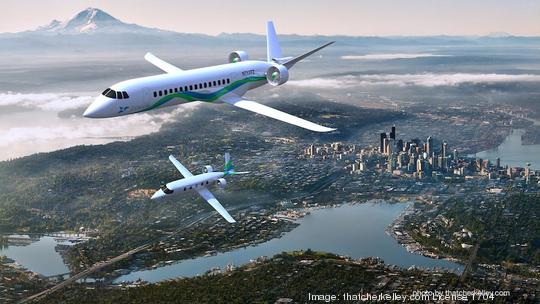
A Kirkland, Washington-based startup working on electric aircrafts is getting their technical team off the ground in Illinois.
Zunum Aero is seeking to get smaller electric aircrafts with a range of up to 700 miles off the ground by the early 2020s and a larger electric aircraft with a range up to 1,000 miles in the skies by 2030. Their focus is running smaller passenger planes on shorter routes between regional airports.
While the startup is based in Washington, there's an Illinois connection: Cofounder Kiruba Haran is an electrical engineering professor at University of Illinois at Urbana-Champaign and the startup partnered with a UIUC-led center researching battery density. Now the startup has announced it has hired Rockford-based Waleed Said, an aerospace engineer with 30 years experience, as CTO, who said he'll be building a technical team and doing initial tests in Northern Illinois.
Chicago Inno chatted with Said to hear more about why he's building a technical team in the Midwest, the obstacles to getting electric aircrafts airborne, and whether the startup has plans for a Chicago-area route.
Chicago Inno: Tell us a bit more about your background, and why you're working out of the Chicago area.
Waleed Said: I worked almost my entire career at UTC Aerospace Systems which is a division of UTC in the Rockford area. That division of UTC is the leader in the world for making electrical generation and conversion for airplanes for the aerospace industry. I spent almost all my career there working on [the electrical systems in] Boeing airplanes and Lockheed Martin airplanes.
It was a natural departure from working on advanced airplanes to a totally electric airplane that is going to lead the way to the future of electric propulsion.
Will you be building a technical team in Chicago?
The Northern Illinois area is rich in talent of airspace engineers through the many companies that are in the Chicago area and in the suburbs--Schaumburg, Elgin and Rockford. There is a very large talent pool that is available that we’d like to tap into. Besides that, because it is an industry that has already existed in the Northern Illinois region, there are facilities and test sites that are available for us to utilize to test and verify our designs. So we don’t have to go somewhere else to invest in test facilities and brick-and-mortar stuff when these facilities exist.
Tell me a bit more about your role as the CTO of a startup that’s trying to get electric aircrafts off the ground. What is your main goal as CTO of Zunum Aero?
Basically, building a strong team of engineers and scientists that will help the company design and produce this new breed of airplanes. That’s one of my major goals here, develop the capability of the company, mainly the engineering team and talent, but also building the infrastructure of the company. Being a startup company [we are] very lean. What I need to do is put some structure in to the development of the equipment that will eventually go into an airplane that carries people and has to meet FAA requirements.
The other thing is to challenge some of the assumptions that were made in the inceptions of this airplane and validate those assumptions, and make sure that they are valid to go on a credible airplane that will be sold to airlines.
Where are you at in development now?
What we’re doing now, is we’re actually putting a validation--what we call a copper bird--a validation lab in Northern Illinois to prove that amount of power that is needed to run this airplane is viable.
What have been the obstacles to creating all-electric aircrafts in the past?
The technology should be there right? But the obstacle is the energy density. The amount of power that can be packed into batteries that is large enough to fly an airplane...it’s a lot of power. What’s helped that is the automotive industry being the leader in creating the battery sources that are going into hundreds of thousand of cars. That's driving the competition between battery manufacturers to produce the energy that is required for a car or even a truck or even an off-road vehicle.
The rest of the technology, it’s a matter of scale. The technology exists, but it’s not the scale that an airplane needs. Now our job is to scale it up with supporting technologies, like power conversion and electric motors. We need to scale them up to the power required to fly an airplane, as well as make them dense enough in the sense it weighs less than a motor for a car, because an airplane needs to be light to fly.

Why is Zunum Aero going to be able to innovate in the way that other airlines and plane manufacturers haven’t in getting these planes off the ground?
Zunum came up with a model called door-to-door—it’s a cost model--which is addressing the market that is not competitive when it comes to jet engines: the 500-mile market, say from Chicago to Detroit. And that’s true for the entire country. What Zunum is looking at is avoiding the major hubs such as O’hare or Midway and try to fly from small regional, general aviation airports where a traveler would Uber or drive to the airport, get on the airplane, fly for an hour, land in a similar airport, and take an Uber or car to the door they need to get to.
So because you’re starting with shorter range and smaller planes, the battery density doesn’t have to be quite as power dense as opposed to if you’re putting these in a large passenger airplane from larger hubs. That allows you to fast track technology as well, correct?
Absolutely. We’re targeting the 500 miles to 700 miles because that’s what we believe the battery technology can provide in the next five to 10 years, and if we try to go beyond that it will be way too heavy today to take off of the airport, let alone carry passengers and make money for the operators.
There are probably quite a few challenges even getting to 500 and 700 miles. What are the big technical challenges you’re looking to tackle moving forward?
The major technical challenge is the density of the battery. We’re keeping our eyes open, trying to be agnostic to the batteries where we’re designing the airplane so as by 2022, whatever battery technology that we feel is more suitable to the flight profiles we need, we’ll go for that.
That’s one of the risk reductions. It is a risk trying to lock ourselves into one battery technology or chemistry. So we’re trying to be open to that.
"We’re targeting the 500 miles to 700 miles because that’s what we believe the battery technology can provide in the next five to 10 years."
How do you feel about making the jump to startups, and how do you see the larger companies as compared to smaller aviation startups?
I’m very excited. It’s definitely a different role and different rhythm and different operating system. However, I see ourselves, as we transition into a company that actually produces hardware and actually sells to airlines nationally, it’s not going to be a startup because there are all kinds of regulation, government and safety regulations. That makes me happy as a traveler. I’m sure it makes anyone happy who wants to fly on those airlines.
For me, specifically, I spent almost 30 years in the aerospace industry and all these years I was doing electrical design for airplanes, and when we get to the point where I see this airplane fly, that would be a great conclusion to my career.
What are the chances an early route will be in Illinois?
I will leave that to the airlines. It would be great to have the first flight coming out of one of the regional airports in the Midwest. I’ll try for that. But we’ll see.
Note: This interview has been edited for length and clarity. Image credit: Zunum Aero








